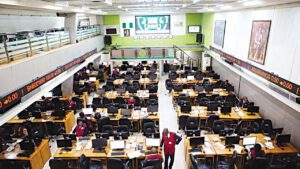
Equities market drops by N91.3bn in September
Despite impressive corporate earnings by listed companies, the equities market depreciated by N91.3billion in market capitalisation in September 2023 as investors traded with caution.
The market capitalisation closed September at N36.331trillion from N36.422trillion it opened for trading, while the Nigerian Exchange Limited All-Share Index (NGX ASI) stood at 66,382.14basis points, 0.25per cent decline from 66,548.99 basis points it opened for trading.
The equities market surpassed capital market analysts’ prediction this year, gaining about N8.42trilllion in market capitalisation backed by federal government foreign exchange unification and impressive corporate earnings.
The market capitalisation closed September 2023 at N36.381trillion, gaining N8.42trillion or 30.15per cent from N27.915trillion it opened for trading this year.
With an average year-to-date return of 29.52 per cent the NGX All-Share Index joined other Exchanges in Africa to become top five best behind, Zimbabwe Stock Exchange (540.18 per cent), Malawi Stock Exchange (90.90 per cent), Egyptian Exchange (38.19 per cent), and Ghana Stock Exchange (29.81 per cent).
Benchmark indices at the NGX closed September 2023 at 66,382.14 basis points from 51,251.06 basis points the stock market opened in 2023.
In September, however, Investors on the equities market lost N757billion in two-day over demotion of NGX from frontier to unclassified market status by FTSE Russell.
FTSE Russell, the subsidiary of London Stock Exchange Group (LSEG) downgrade is on the backdrop of Nigeria’s foreign exchange (FX) challenges which is a new source of negative sentiment that is capable of triggering equities sell off at the Exchange.
Despite being dominated by local investors, the downgrade affected stock market performance on the first two trading this week, as most indices recorded notable sell pressures while year-to-date (YTD) returns tumbled to 29.52 per cent.
Activities in the local bourse have been dominated by local investors, who accounted for 94per cent of market participants, while foreign investors accounted for 14.15 per cent as of August 2023 from 5.77per cent in July, as analysts have expressed that the report may not be a major concern for the local market as greater concerns are the local dynamics.
Speaking on the report, the Vice President, Highcap Securities Limited, Mr. David Adnori attributed the decline in equities market performance in September to possible downgrade by FTSE Russell, stressing that foreign investors since the report was released have shown negative sentiments.
According to him, “The decline in the stock market can be linked to FTSE Russell downgrade and other macroeconomy reports. For instance, the revenue target of the FG may not be realised because daily crude oil production is 1.6mpd whereas Nigeria is only producing up to 1.2mpd.
“I think the FTSE Russell report maybe relevant to foreign investors who have been suffering from the inability to repatriate their dividend for several years.
“Capital market cannot be held for foreign exchange crisis because investors are paid in Naira. Since they brought dollar into the stock market based on the agreement with CBN on capital importation, then the responsibility was on CBN to facilitate the conversion of naira income to foreign currencies and remit abroad
“CBN has failed on its responsibilities and as it is now, it is like foreign investors’ have transferred aggression to the capital market. The foreign exchange crisis does not have anything to do with domestic investors.”
FTSE Russell said further to the ‘FTSE Equity Country Classification – Watch List Status of Nigeria’ announcement published on June 30 that it has received feedback from market participants that although Nigeria has adopted a floating foreign exchange rate for the Naira in the Investors’ & Exporters’ (I&E) FX Window, which is now operating on a “Willing Buyer, Willing Seller” basis, “the lack of liquidity in the I&E FX Window continues to adversely impact the ability of international institutional to replicate benchmark changes.”



